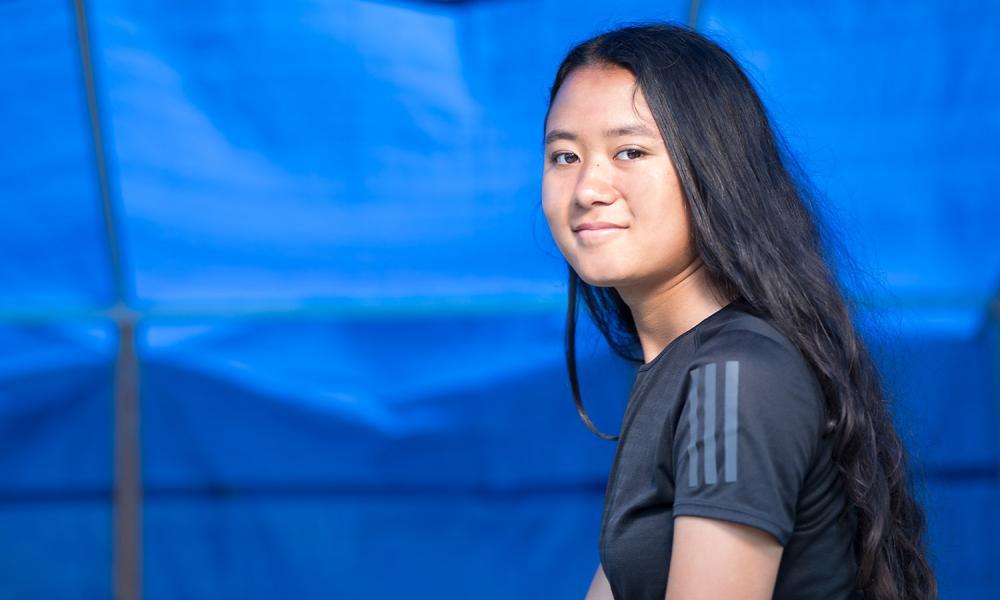
Say Meh and her family celebrate faith and freedom
To the casual observer, Say Meh (pronounced Say M’EH) looks like an average, shy 15-year-old. Her soft voice and gentle manner might make her seem reserved. If you ask, she will tell you there is nothing extraordinary about her. But take a minute to visit with Say, and you will discover her story is anything but average.
On a Sunday afternoon, she is sitting in her family’s living room in a quiet Lansing neighborhood. Say’s mother, Preh Mor, leans back on the couch next to her youngest child. Dressed in a T-shirt and batik wrap skirt, Preh looks to her daughter to translate between their native Kayah language and English.
“We came to the U.S. on March 22, 2009. My mother, father, three brothers, sister and I had been living in a refugee camp in Thailand. My youngest brother and I were born there. Everyone else was born in the Karenni (pronounced kah-REN-nee) state of Burma.
“We are Karenni, a Catholic minority who have lived in Burma since before World War II. Our people helped the British free Burma from the Japanese and were promised independence. But when Britain withdrew, they left the Karenni under the control of the Burmese majority. Soon civil war broke out between the Burmese military, who ruled the country, and Karenni armed fighters.
“I don’t really know why we lived in a refugee camp.” Say turns to her mother and asks for the story of how they earned refugee status. As Preh recounts their family’s experience, her face betrays little emotion – almost trance-like. Yet as the music of her mother’s story flows into the living room, various emotions wash over Say’s face. After a few minutes of intense listening, the daughter turns to share the extraordinary details.
“Burmese soldiers regularly came into Karenni villages to take what they wanted and keep our people in fear. Just after my parents got married, soldiers came to their house and grabbed my father along with other young men from the village. They forced the Karenni men to move their war machines and supplies through the jungle without any payment and only a handful of food. Many died of illness or starvation. One night, when they were camped along a river, my father made a raft of bamboo and escaped. He made his way back to our village and my mom. No soldiers came after him because they didn’t really keep track of their prisoners. If they lived or died, it didn’t matter.”
Say pauses. “This is the first time I’m hearing this story,” she explains. “I feel so bad for my parents.”
She continues, “Over the next five years, they built a house on a hill and farmed the land around it. They had my two oldest brothers and my sister and created a good life with other Karenni families in their village. In 1995, there was a cease-fire agreement, but it only lasted a couple months. In June 1996, Burmese soldiers started attacking the Karenni again, burning down houses, taking away properties and killing civilians.
“One day, my parents got a letter from the Burmese military saying they had 15 days to get out of their house or be removed. Knowing how my father had been treated by the soldiers, they decided to escape to a refugee camp just over the border in Thailand. They had three children under the age of 5 and my mom was pregnant, but they left immediately. Later, they learned the military burned and destroyed everything.
“Weeks after they arrived in the camp, my brother was born. I came along a couple years later. I don’t remember much about that time, except bamboo houses – larger bamboo stalks for the floor and ceiling and woven mats for the walls. The bathroom was a ditch running through the camp, and we went to the communal showers at the center of the camp for our water.
“I remember going to a different school than my brothers and sister. I learned my ABCs in English. We all learned English, and my brothers and sister also learned Burmese and Kayah along with other subjects.”
“I remember something like a store.” She asks her mother about that memory and listens intently as Preh replies. Then Say shares:
“My mother says the U.N. rice rations weren’t enough for everyone because wealthy nations cut back funding to the United Nations High Commissioner for Refugees (UNHCR). But it wasn’t legal for refugees to farm in Thailand. So, to get more food and earn some money, she and my father snuck back into Burma to visit Karennis who still farmed along the border. They brought fresh produce back into the camp to sell.
“One day, some people from the UNHCR-U.S. resettlement program came to our camp and offered everyone a chance to come to America. Mom and Dad talked it over. My uncle, who also lived in the camp, chose to return to Burma because he didn’t speak English. But my parents decided America would be our best option, even though they didn’t speak English either.”
“We came to Lansing in the spring.
I remember a couple greeting us at the airport and giving us pots and pans. St. Vincent Catholic Charities helped my parents find a house we could afford, and they provided furniture – including couches and beds. They also helped us enroll in school, and helped my parents find jobs where language wouldn’t be a barrier.
“My mom works at Sohn Linen, and my older brothers and sister work there now that they have graduated from high school. My dad works at Peckham Industries. My next oldest brother is enrolled in a mechanics program at Lansing Community College.
“Mom says she likes living here because you don’t hear any shots or fighting, and she can work inside instead of being outside all the time. But she and my father still sell some crops from their garden and we eat the rest. She is grateful she can pay the monthly light, water and mortgage bills with what they earn and with some help from my brothers’ and sister’s paychecks.
“And we can celebrate our faith the way we want. We attend Mass every Sunday at St. Mary Cathedral with about 30 to 35 other Karenni families. There is a Karenni priest who comes up from Indiana about once a month to hear confessions and say Mass. Our faith is an important part of everyday life. Faith sets ground rules for day-to-day-life.”
Say was confirmed this past spring at St. Mary Cathedral. “I was at Resurrection School for three years, and now I’m a sophomore at Lansing Catholic. I played soccer last year, and I’m part of a dance troupe that performs at special Karenni gatherings like the National Conference of Burmese-American Catholics (NCBAC). I think dancing helps keep our culture alive, and it brings together people from all kinds of Karenni and Burmese dialects and traditions.
“I can’t think of anything interesting about myself. I guess I’d like readers to know more about the Karenni people’s history and traditions. There are obviously things I didn’t know.” Say looks admiringly at her mother sitting serenely on the couch. She smiles, “But now I do know I have a lot to be proud of!”
St. Vincent Catholic Charities Refugee Services
St. Vincent Catholic Charities (STVCC) is the designated refugee resettlement agency for adults and families in mid-Michigan. STVCC Refugee Services assists with the basic essentials to welcome refugees to the Lansing community and help them reach self-sufficiency.
To learn more, or to volunteer, visit stvcc.org or call 323.4734, ext. 1424.



